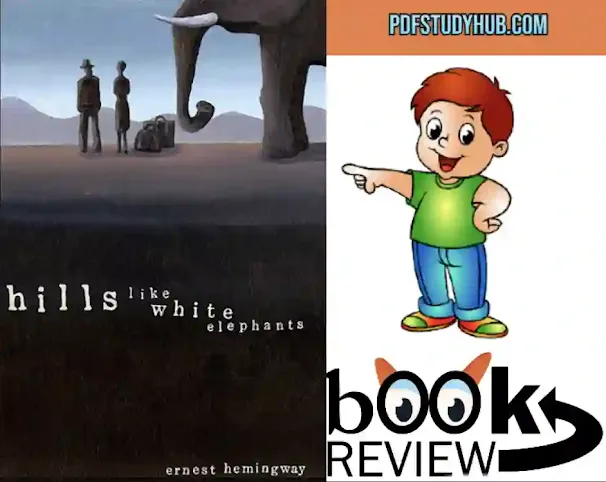Hills like White Elephants by Ernest Hemingway Books Summary
Introduction:
"Hills Like White Elephants" is a short story written by the renowned American author Ernest Hemingway, first published in 1927 in the literary magazine transition. The story is often considered a prime example of Hemingway's minimalist writing style and is widely studied for its subtle exploration of complex themes such as communication, decision-making, and the nature of relationships.
Set in a remote train station in Spain's Ebro Valley, the narrative revolves around a seemingly ordinary conversation between a man and a woman, but beneath the surface, the story delves into profound emotional and existential territory.
Summary:
The story opens with a vivid description of the Ebro Valley, where two characters, an American man and a young woman named Jig, are waiting for a train.
The couple sits at a small table outside the station, enjoying drinks while admiring the hills in the distance, which are compared to "white elephants." The term "white elephant" carries a connotation of something burdensome and unwanted, foreshadowing the central conflict of the story.
As the conversation unfolds, it becomes apparent that the couple is facing a critical decision. They indirectly allude to the possibility of ending a pregnancy, suggesting that Jig is pregnant, and the man wants her to have an abortion.
The issue is subtly revealed through their dialogue, which is filled with a sense of tension, subtext, and unspoken emotions. Hemingway's use of dialogue creates a strong sense of ambiguity, leaving readers to infer the exact nature of their conversation.
The American man attempts to persuade Jig to undergo the procedure, emphasizing its apparent simplicity and claiming that it will resolve all their problems.
He seems focused on preserving their carefree lifestyle, implying that a child would only hinder their enjoyment. Throughout the conversation, he repeatedly tells Jig that he loves her, but his actions and arguments reveal a self-centered and manipulative attitude.
Jig, on the other hand, is torn between her own desires and the pressure placed upon her by the man. Her uncertainty and vulnerability are evident as she grapples with the decision, seeking reassurance and validation.
She wonders aloud if things will be as they were before the pregnancy, indicating her fear of losing the connection and affection they once shared. This shows that she genuinely cares for the man but is also aware of the sacrifices she may have to make to maintain the relationship.
As the story progresses, the emotional distance between the characters becomes more apparent. The train station serves as a metaphorical crossroads, symbolizing the pivotal moment in their relationship. It represents the choices they must make, with the train tracks leading in two different directions, mirroring the divergent paths they might take.
The conversation becomes increasingly tense, reaching a climactic moment when the woman looks at the hills and comments that they "look like white elephants." The man responds by saying he has never seen one, to which she replies, "No, you wouldn't have." This brief exchange carries deeper meaning, suggesting that the man lacks the sensitivity and understanding to appreciate the gravity of the situation from the woman's perspective.
As the story concludes, the couple's train arrives, but they are not yet ready to board. The decision remains unresolved, and the story ends ambiguously, leaving readers to speculate about the characters' future. Hemingway's open-ended conclusion allows readers to grapple with the complexities of the situation and explore the characters' internal struggles.
Themes and Symbolism:
1. Communication and Miscommunication: The story highlights the importance of effective communication in relationships. The couple's conversation is characterized by veiled language and unspoken emotions, leading to misunderstandings and unaddressed concerns. The lack of direct communication hinders their ability to truly connect and understand each other.
2. The Abortion Dilemma: Hemingway explores the theme of abortion and its potential consequences. The story does not explicitly mention the word "abortion," but the symbols and subtext make it clear that the characters are dealing with the decision. The couple's differing views on the matter illustrate the complexities and emotional toll such decisions can have on individuals and relationships.
3. The Hills as White Elephants: The hills in the distance are a prominent symbol throughout the story. They represent the burden and unwanted responsibility the characters are facing, akin to a white elephant—a term for something that is more of a hindrance than a benefit. The description of the hills as "white elephants" mirrors the couple's situation and the weight of their unresolved decision.
4. Power Dynamics in Relationships: The story subtly explores the power dynamics between the man and the woman. The man appears to hold more influence in the relationship, using persuasion and manipulation to convince the woman to go along with his wishes. This unequal power dynamic raises questions about agency and autonomy in relationships.
Conclusion:
Ernest Hemingway's "Hills Like White Elephants" is a masterful example of concise storytelling that delves into complex themes through subtle dialogue and symbolism. The story's exploration of communication, decision-making, and the intricacies of relationships continues to captivate readers and remains relevant in contemporary discussions on gender, power, and reproductive rights.
As a seminal work in modern literature, this short story remains an enduring and thought-provoking piece that invites readers to contemplate the complexities of human emotions and the delicate balance between individuals within a relationship.
Also read: Dice of Dreams by Uma Maheshwari Book Review
Also read: The Incomplete Fear By Guru Srinivas Book Review
Also read: The Incomplete Fear By Guru Srinivas Book Review
Also read: Still Beating by Jennifer Hartman Book Review
Also read: Love, Theoretically by Ali Hazelwood Book Review
THANK YOU SO MUCH

Comments
Post a Comment